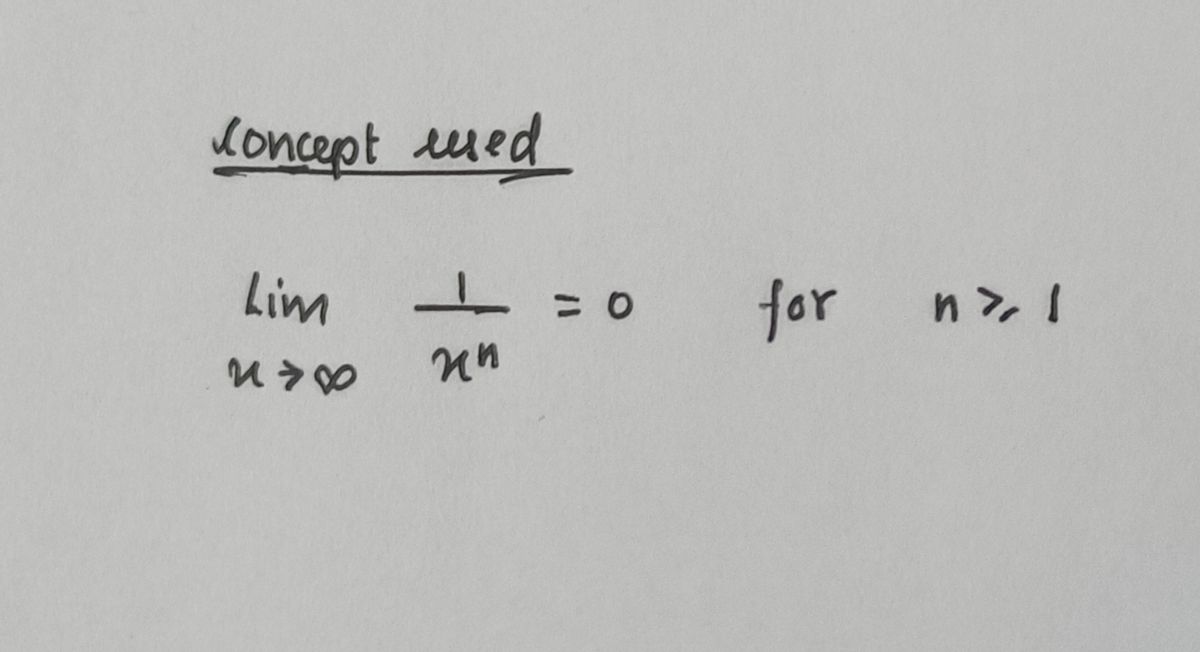Calculus: Early Transcendentals
8th Edition
ISBN:9781285741550
Author:James Stewart
Publisher:James Stewart
Chapter1: Functions And Models
Section: Chapter Questions
Problem 1RCC: (a) What is a function? What are its domain and range? (b) What is the graph of a function? (c) How...
Related questions
Question
![**Determine the limit at infinity.**
\[ \lim_{{x \to -\infty}} \frac{7x^3 - 2x^2 + 3x}{-x^3 - 2x + 7} \]
In this problem, we need to evaluate the limit of a rational function as \( x \) approaches negative infinity. The expression is a fraction where the numerator is \( 7x^3 - 2x^2 + 3x \) and the denominator is \(-x^3 - 2x + 7\).
Approaching the limit, we focus on the terms with the highest degree of \( x \) in both the numerator and the denominator to simplify the process. Here, the highest power of \( x \) in both the numerator and denominator is \( x^3 \).
Therefore, the limit simplifies to:
\[ \lim_{{x \to -\infty}} \frac{7x^3}{-x^3} = \lim_{{x \to -\infty}} -7 = -7. \]
Thus, the limit is \(-7\).
**Explanation of Process:**
1. Identify the highest degree term of \( x \) in both the numerator and the denominator.
2. Divide both the numerator and denominator by \( x^3 \).
3. Simplify the expression as \( x \) approaches negative infinity.
4. The resulting limit is determined by the leading coefficients of these terms, which leads to the value of \(-7\).](/v2/_next/image?url=https%3A%2F%2Fcontent.bartleby.com%2Fqna-images%2Fquestion%2F175db289-e348-4e5d-8b27-3b33aa3de0ab%2F91b93cb5-6713-42f3-bc96-8e3ed7a60af1%2F1xgteio_processed.jpeg&w=3840&q=75)
Transcribed Image Text:**Determine the limit at infinity.**
\[ \lim_{{x \to -\infty}} \frac{7x^3 - 2x^2 + 3x}{-x^3 - 2x + 7} \]
In this problem, we need to evaluate the limit of a rational function as \( x \) approaches negative infinity. The expression is a fraction where the numerator is \( 7x^3 - 2x^2 + 3x \) and the denominator is \(-x^3 - 2x + 7\).
Approaching the limit, we focus on the terms with the highest degree of \( x \) in both the numerator and the denominator to simplify the process. Here, the highest power of \( x \) in both the numerator and denominator is \( x^3 \).
Therefore, the limit simplifies to:
\[ \lim_{{x \to -\infty}} \frac{7x^3}{-x^3} = \lim_{{x \to -\infty}} -7 = -7. \]
Thus, the limit is \(-7\).
**Explanation of Process:**
1. Identify the highest degree term of \( x \) in both the numerator and the denominator.
2. Divide both the numerator and denominator by \( x^3 \).
3. Simplify the expression as \( x \) approaches negative infinity.
4. The resulting limit is determined by the leading coefficients of these terms, which leads to the value of \(-7\).
Expert Solution
Step 1

Step by step
Solved in 2 steps with 2 images

Recommended textbooks for you

Calculus: Early Transcendentals
Calculus
ISBN:
9781285741550
Author:
James Stewart
Publisher:
Cengage Learning

Thomas' Calculus (14th Edition)
Calculus
ISBN:
9780134438986
Author:
Joel R. Hass, Christopher E. Heil, Maurice D. Weir
Publisher:
PEARSON

Calculus: Early Transcendentals (3rd Edition)
Calculus
ISBN:
9780134763644
Author:
William L. Briggs, Lyle Cochran, Bernard Gillett, Eric Schulz
Publisher:
PEARSON

Calculus: Early Transcendentals
Calculus
ISBN:
9781285741550
Author:
James Stewart
Publisher:
Cengage Learning

Thomas' Calculus (14th Edition)
Calculus
ISBN:
9780134438986
Author:
Joel R. Hass, Christopher E. Heil, Maurice D. Weir
Publisher:
PEARSON

Calculus: Early Transcendentals (3rd Edition)
Calculus
ISBN:
9780134763644
Author:
William L. Briggs, Lyle Cochran, Bernard Gillett, Eric Schulz
Publisher:
PEARSON

Calculus: Early Transcendentals
Calculus
ISBN:
9781319050740
Author:
Jon Rogawski, Colin Adams, Robert Franzosa
Publisher:
W. H. Freeman


Calculus: Early Transcendental Functions
Calculus
ISBN:
9781337552516
Author:
Ron Larson, Bruce H. Edwards
Publisher:
Cengage Learning